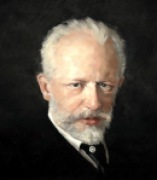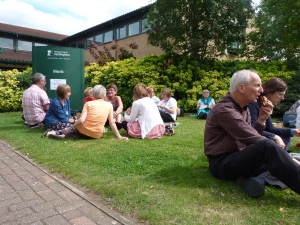 Having founded the Nottingham Choral Trust (now Music for Everyone) in 1983, Angela decided that a permanent chamber choir might add to the confidence of the Nottingham Festival Chorus and enable even more challenging works to be sung. In 1985 she formed an auditioned group, the East of England Singers (EOES), originally intended to perform for part of each season with the East of England Orchestra (now Sinfonia Viva) – hence the name.
Having founded the Nottingham Choral Trust (now Music for Everyone) in 1983, Angela decided that a permanent chamber choir might add to the confidence of the Nottingham Festival Chorus and enable even more challenging works to be sung. In 1985 she formed an auditioned group, the East of England Singers (EOES), originally intended to perform for part of each season with the East of England Orchestra (now Sinfonia Viva) – hence the name.

Some of the current choir have been members ever since, and in June 2015 the choir celebrated its thirtieth birthday with a reunion choir performance of Bach’s magnificent Mass in B minor. Members often say that EOES is the friendliest choir they have ever sung with. We work hard not just at our singing but also for Music for Everyone, with most of us contributing something to other groups, both adult and youth: Tea makers, cake bakers, shop runners, Bookwise helpers, blog writers, programme note writers, tour organisers, membership secretaries, accounts, NFC accompanist, Daytime Voices and Vocals! conductors, accompanists and helpers, recorder players, organist, violinist, harpsichordist, staging, lighting, sound, photography etc. You name it, we do it!
Our next concert is very soon. Saturday 17 October, 7.30pm, St John’s Church, Mansfield Rd, Carrington, Nottingham. The programme, spanning almost three centuries, comprises sacred and secular works that vary in mood from sombre to joyful, and in sound from gentle and melodious to rhythmic and dramatic. There will be trumpets and drums, other brass and wind instruments and, of course, the choir. We would be delighted to see you there and for you to enjoy music by Purcell, Stravinsky, Mozart and Bruckner.
Click here to see the programme and for tickets.
More about EOES and joining the choir.
 violin and piano, six symphonies and other orchestral works. He wrote songs, instrumental music and opera, the best known of which is Eugene Onegin. He was a troubled man from a young age until his death. Whether he died from natural causes or suicide remains a point of conjecture. He wrote music of passion and deep emotion, but by no means all melancholic. Music, it’s good for the soul.
violin and piano, six symphonies and other orchestral works. He wrote songs, instrumental music and opera, the best known of which is Eugene Onegin. He was a troubled man from a young age until his death. Whether he died from natural causes or suicide remains a point of conjecture. He wrote music of passion and deep emotion, but by no means all melancholic. Music, it’s good for the soul.





